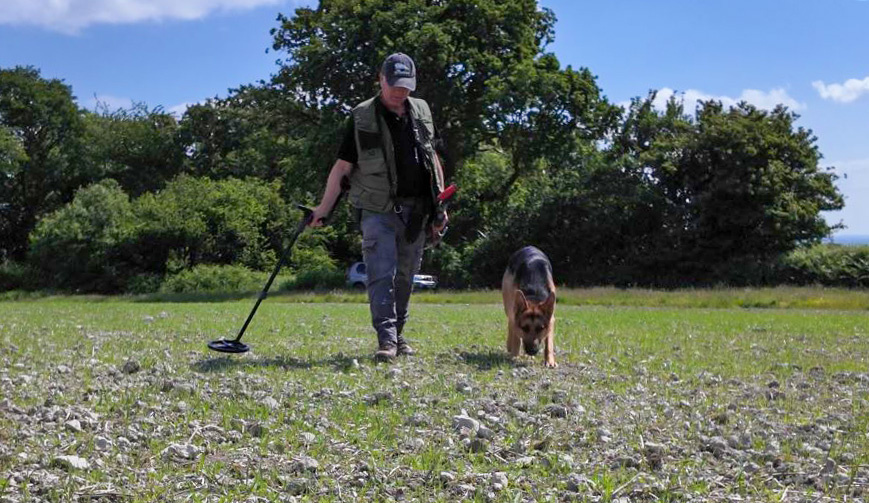Why Metal Detecting Is the Perfect Hobby – And How to Get Started
Why Metal Detecting Is the Perfect Hobby - And How to Get Started
You never forget your first beep
It often starts with curiosity. A quiet walk through the woods, a metal detector in hand - and suddenly: beep. Your heart skips a beat. You dig carefully... a coin! Old, worn, but found by you. That moment is what brings many detectorists back time and time again.
Metal detecting isn't just a hobby - it's an experience. Every hunt is an adventure where you never know what you'll uncover. Sometimes a historical relic, sometimes a rusty nail - but always the thrill of the unknown.
What is metal detecting?
Metal detecting is the practice of searching for metallic objects buried in the ground using a metal detector. From forgotten euros to centuries-old buckles - the earth hides more than you think. You'll learn to read the soil: sand, clay, dry, wet - each spot has its own story.
It's a mix of nature, technology, history, and relaxation. For many, it's also a way to disconnect from screens and reconnect with the outdoors.
Why are more people getting into metal detecting?
In today's fast-paced world, people are searching for peace, purpose, and a sense of discovery. Metal detecting offers all of that - and more:
- You spend time outdoors in nature
- You learn about history and the landscape
- It's calming, yet exciting
- You don't need any prior experience
The beauty of simplicity
“I started with a basic detector and wandered down an old dirt path. After an hour I found a copper coin. That was it - I was hooked.”
That's what we hear often. The simplicity is part of the charm. You don't need to be an expert or have expensive gear. Curiosity and a bit of patience are enough.
What do you need to get started?
A reliable metal detector is your main tool, but some accessories make the experience much smoother:
- Metal detector: Choose one that matches your skill level
- Pinpointer: To locate the exact spot of the object
- Finds pouch: To store your discoveries
- Digging tool: A hand trowel or spade for clean digging
- Gloves: For extra protection
Which detectors are great for beginners?
Here are a few popular entry-level models:
- Nokta Simplex Ultra - Easy to use, waterproof, affordable
- XP ORX - Lightweight, wireless, and powerful
- Minelab Vanquish 440 - Multi-frequency technology, simple interface
- Quest X10 Pro - Budget-friendly and fully waterproof
We're happy to help you choose the right one - in-store or online via chat or WhatsApp.
Common beginner mistakes (and how to avoid them)
- Detecting without permission: Always get approval for private land
- Lacking patience: Great finds don't appear in five minutes
- Messy digging: Dig responsibly and restore the ground properly
- Too many settings: Start with the default settings - they work well
How much does it cost to start metal detecting?
Many think it's an expensive hobby, but that's not the case. A full beginner setup costs between €300 and €700 and typically includes:
- A reliable metal detector
- A pinpointer
- A pouch and digging tool
- Chargers or batteries
Most equipment lasts for years. No subscriptions or ongoing costs - once you're set, you're ready to go.
Where's the best place to start?
- Old walking trails
- Fields or meadows (with permission)
- Beaches (especially after busy summer days)
- Your own backyard - often full of surprises
Some of the best first finds come from just outside your door.
What do others say about their first finds?
“I found a WW2 bullet casing in the woods behind our house. My grandfather used to play there. Gave me goosebumps.”
“In a local park I found a silver ring. Maybe not valuable - but such a magical moment.”
Frequently Asked Questions (FAQ)
- Is metal detecting legal?
Yes, but there are rules. Protected archaeological sites are off-limits, and private land requires permission. - Can I detect on the beach?
Often yes, but local regulations may vary - always check. - How deep do detectors go?
On average 15-30 cm, depending on the object, soil, and settings. - Do I need batteries or a charger?
Yes - most detectors are rechargeable or run on AA/AAA batteries. We include the required accessories with your purchase.
Detect Metaaldetectors - your trusted partner to get started
At Detect Metaaldetectors in Almelo (The Netherlands), we support both beginners and experienced detectorists. We offer top brands, honest advice, and excellent service - in-store and online.
Want to try a detector or get personal advice? Visit us or reach out - we're happy to help you get started the right way.






